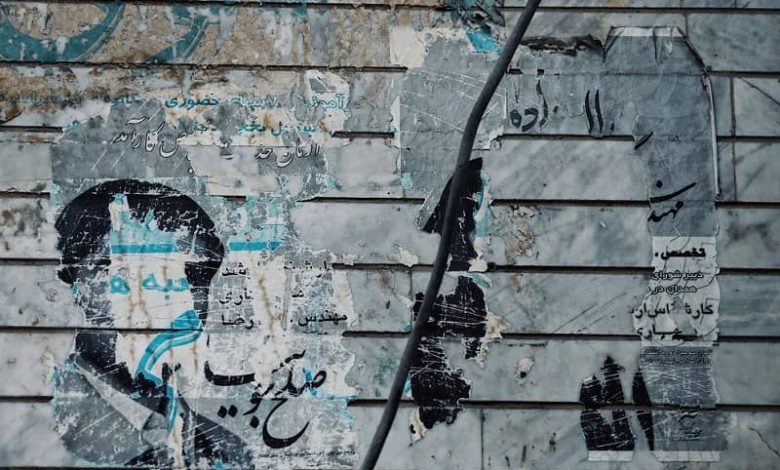Iran Election 2021: Iranian Boycott of Presidential Election is Part of a Larger Trend of Resistance

Written by
Mahmoud Hakamian
Iran Election 2021: With Recent Protests, Forthcoming Electoral Boycott Iranians Deny Tehran’s Legitimacy
File photo: destroyed campaign posters on the wall
Iranian regime’s interior ministry announced the names of candidates approved by the Guardian Council to run for the presidency in the upcoming sham Presidential election. The Guardian Council has purged all the candidates except for seven of the most loyal officials to the regime’s Supreme Leader, Ali Khamenei.
In a statement, Mrs. Maryam Rajavi, the President-elect of the National Council of Resistance of Iran (NCRI), said that “Khamenei took steps to consolidate the regime and maximize repression by purging presidential candidates who had participated in all of the regime’s crimes over the past 40 years. This is a clear sign of the regime’s crisis of overthrow and the final phase of the religious, terrorist dictatorship.”
Mrs. Rajavi also called for the Iranian people’s nationwide boycott of the election farce.
The Iranian regime has been noticeably concerned about the prospect of historically low turnout in the election next month. The sentiment is reflected in various commentaries published by the regime state-run media outlets in recent weeks. The daily newspaper Hamdeli, which is closely associated with a “hardline” political faction, said on April 25 that “all candidates face a serious obstacle from non-participation in the election.” The same article warned of the “social consequences” of that non-participation being extremely widespread – consequences that are especially worrying to the regime officials in the wake of recent nationwide unrest.
In December 2017, protests against worsening economic conditions in Iran began to spread from city to city, taking on a more general political message as they did so. By the middle of the following month, the protest movement encompassed well over 100 localities and came to feature chants of “death to the dictator” and other explicit calls for regime change.
Hamdeli made specific reference to the 2019 uprising in its warning about the potential for a broadly organized boycott of the farce election. Other outlets have done the same, including Jahan-e Sanat, which emphasized the unresolved grievances associated with each recent protest movement. “A large part of society has boycotted elections due to mismanagement of the coronavirus crisis, economic woes, pressure on people’s livelihood, and officials’ negligence regarding the social events of January 2018 and November 2019,” it said in another April 25 article. “Given the status quo, a significant voter turnout is unlikely.”
That quotation is particularly significant because it underscores the common threads running through both of the uprisings, the emerging electoral boycott, and the fact that a large segment of the population “has boycotted elections” in the past. The widespread expectation of low turnout on June 18 is based in part on the success of the boycott campaign that preceded the regime’s parliamentary elections in February 2020. In that case, even official government statistics, which are frequently inflated in such matters, acknowledged that less than half of eligible voters participated, making it the most unpopular election in the 40-year history of the regime.
This outcome was a testament to the Iranian people’s escalating conflict with the regime. But more to the point, it was a testament to the organizing efforts of the leading pro-democracy opposition group, the People’s Mojahedin Organization of Iran (PMOI/MEK). The MEK has consistently urged the general public to sit out “sham elections” as a way of “voting for regime change” and denying legitimacy to a system that bars all but the most loyal acolytes of the clerical supreme leader from seeking government office.
The MEK Resistance Units across Iran are currently hard at work promoting this goal. Public demonstrations, posters, and graffiti messages were identified in at least 250 locations in April alone, all of which strongly reiterated the notion that refusal to vote is tantamount to voting for regime change.
Based on the prevalence of that message, it must be assumed that virtually all Iranian activists are aware of the implications when they endorse the electoral boycott. Countless individuals have done so in recent weeks, including pensioners and victims of government-run investment scams. Groups of such individuals have taken part in loosely connected protests across much of the country, and most of them have come to feature slogans declaring that participants “will no longer vote” in the face of persistent lies and miscarriages of justice.
The MEK resistance units have been very active in the election boycott campaign in full awareness of the fact that doing so could land them in jail or make them subject to prosecution, torture, or even execution.
In recent interviews with satellite news networks associated with the democratic opposition, a number of Resistance Units have been unequivocal about their willingness to make the ultimate sacrifice, if need be, for the fulfillment of that goal. Meanwhile, state media continue to merely repeat that concerns about the prospect of a widespread boycott leading to an uprising. Last week, the daily newspaper Sharq noted that the conditions behind that prospect are “a great danger” and that if they are not uprooted from Iranian society, the effect will be “crushing” for the leadership of the regime.

